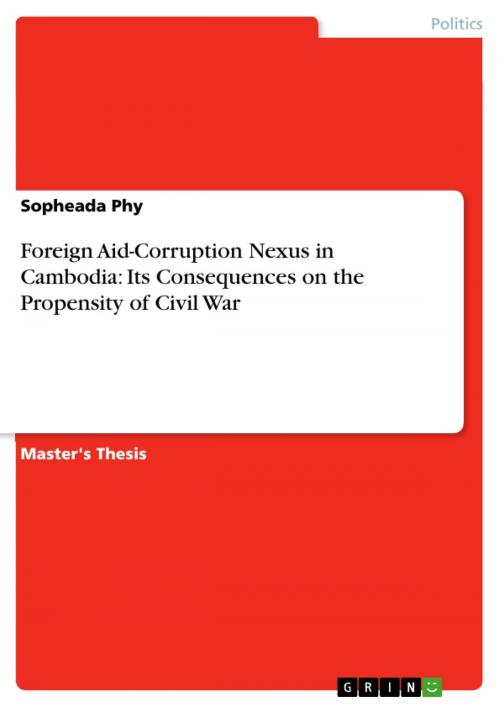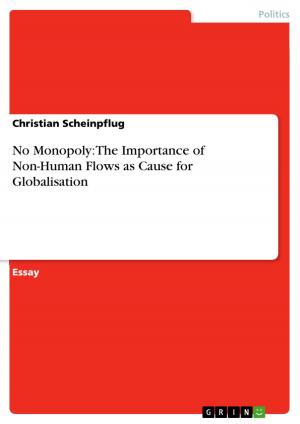Foreign Aid-Corruption Nexus in Cambodia: Its Consequences on the Propensity of Civil War
Nonfiction, Social & Cultural Studies, Political Science, International, International Security| Author: | Sopheada Phy | ISBN: | 9783640533428 |
| Publisher: | GRIN Publishing | Publication: | February 10, 2010 |
| Imprint: | GRIN Publishing | Language: | English |
| Author: | Sopheada Phy |
| ISBN: | 9783640533428 |
| Publisher: | GRIN Publishing |
| Publication: | February 10, 2010 |
| Imprint: | GRIN Publishing |
| Language: | English |
Master's Thesis from the year 2009 in the subject Politics - International Politics - Topic: Peace and Conflict Studies, Security, grade: A, University for Peace (Department of Peace and Conflict Studies), course: International Peace Studies, language: English, abstract: Contemporary Cambodia is most likely best known for two things, aid dependency and corruption. The thesis initially seeks to examine the nexus between foreign aid and corruption in Cambodia since 1993, the time when a huge influx of foreign aid injected into the country following the withdrawal of UNTAC, then explores if the correlation of the two encourages the propensity of civil war, and ultimately analyzes if the onset of civil war is attainable in the case that the propensity of civil war is feasible. Drawing from the analysis, the thesis concludes that 'Foreign aid, particularly loans, indirectly instigates civil war by partly generating corruption, particularly political corruption, because corruption makes aid ineffective in contributing to economic growth and poverty reduction, while encourages huge economic inequality and chronic poverty, which makes Cambodia more vulnerable and prone to civil war'. However, the civil war in Cambodia is manifested or not depends on the motivation and initiative to be resisted and the means of financing the resistant group. Given the status quo of Cambodia, it is possible that the prominent opposition groups such as the opposition political parties can initiate the resistant movement; but it seems improbable. Concerning the ways of financing the rebel movement, by applying the Collier and Hoeffler Model of Civil War, although the opportunity of recruiting the members of the rebel group, the given natural geography, and the cohesion of the movement seems merely attainable, the way of financing the rebellion, through three fundamental means-extortion from the primary commodities-natural resources, donation from diaspora, and subvention from hostile governments-is unlikely feasible. If motivation and finance were not achievable, the rebel movement could not even be formed. However, sometimes unpredictable things might happen.
Master's Thesis from the year 2009 in the subject Politics - International Politics - Topic: Peace and Conflict Studies, Security, grade: A, University for Peace (Department of Peace and Conflict Studies), course: International Peace Studies, language: English, abstract: Contemporary Cambodia is most likely best known for two things, aid dependency and corruption. The thesis initially seeks to examine the nexus between foreign aid and corruption in Cambodia since 1993, the time when a huge influx of foreign aid injected into the country following the withdrawal of UNTAC, then explores if the correlation of the two encourages the propensity of civil war, and ultimately analyzes if the onset of civil war is attainable in the case that the propensity of civil war is feasible. Drawing from the analysis, the thesis concludes that 'Foreign aid, particularly loans, indirectly instigates civil war by partly generating corruption, particularly political corruption, because corruption makes aid ineffective in contributing to economic growth and poverty reduction, while encourages huge economic inequality and chronic poverty, which makes Cambodia more vulnerable and prone to civil war'. However, the civil war in Cambodia is manifested or not depends on the motivation and initiative to be resisted and the means of financing the resistant group. Given the status quo of Cambodia, it is possible that the prominent opposition groups such as the opposition political parties can initiate the resistant movement; but it seems improbable. Concerning the ways of financing the rebel movement, by applying the Collier and Hoeffler Model of Civil War, although the opportunity of recruiting the members of the rebel group, the given natural geography, and the cohesion of the movement seems merely attainable, the way of financing the rebellion, through three fundamental means-extortion from the primary commodities-natural resources, donation from diaspora, and subvention from hostile governments-is unlikely feasible. If motivation and finance were not achievable, the rebel movement could not even be formed. However, sometimes unpredictable things might happen.















